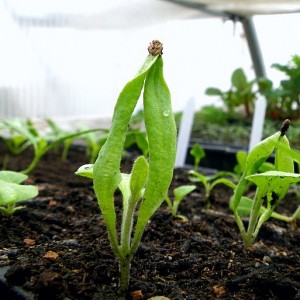USDA Organic: The Dickinson College Farm is officially certified, and soon will add cattle
Dickinson Website
February 8, 2011
 The Dickinson College Farm has already received the stamp of approval from students, staff, community members and shoppers at the weekly farmers’ market, to name a few. Now it has another, albeit more official endorsement to add to its growing list of accolades—United States Department of Agriculture (USDA) Organic Certified.
The Dickinson College Farm has already received the stamp of approval from students, staff, community members and shoppers at the weekly farmers’ market, to name a few. Now it has another, albeit more official endorsement to add to its growing list of accolades—United States Department of Agriculture (USDA) Organic Certified.
Managed through Pennsylvania Certified Organic (PCO), the certification is assurance for consumers that the college farm adheres to an approved approach of agricultural food production that involves building and enhancing the soil naturally, environmental protection and avoidance of toxic or synthetic substances such as pesticides, as required by the USDA National Organic Program.
“The decision to pursue organic certification is not a decision to take lightly,” said Jenn Halpin, director of the Dickinson College Farm. “The fact that we moved forward shows a true and lasting commitment by Dickinson College to everyone who enjoys our organic produce and to students who will continue to benefit from the farm as a living laboratory.”
The certificate arrived in the mail while students were on winter break, according to Halpin, who added that students were integral to the final organic certification process. The three-year process concluded recently in collaboration with Helen Takacs, assistant professor of International Business & Management, who integrated the certification inspection into her first-year seminar course, The Business of Organic Food.
“The students learned a lot during the inspection and said several times that being part of the process helped them understand why and how organic foods are different than conventionally, i.e., chemically, grown foods,” said Takacs, credited Kyla Smith, policy director at PCO, for patiently and carefully answering many student questions. “The course teaches students about the fast pace of organic food growth in comparison to growth in the broader food industry, consumer demand for organic food, profitable business models and how food can be sustainably produced, but there is nothing like a hands-on opportunity at the college farm to bring all of these theories home. It all begins to make sense when one can see it, smell it, touch it – and taste it.”
The USDA requires that anyone producing organic agricultural products be certified by a USDA-accredited official in order to sell, label or represent products as “organic.” PCO is a USDA-accredited program that certifies operations based in Pennsylvania, Delaware, Maryland, New Jersey, New York, Ohio, North Carolina, Virginia, West Virginia and the District of Columbia.
To be certified organic, a producer must develop, implement and maintain an organic system plan. That’s where PCO comes in, providing the information needed to develop a plan. Once the plan is approved and implemented PCO sends a qualified organic inspector to perform an onsite evaluation. PCO determines whether the operation meets the requirements of organic certification, and, if it does, the operation must update its organic system plan and be inspected annually.
Organic certification isn’t the only recent farm news. The Capital Resource Conservation and Development Area Council recently awarded the Dickinson College Farm a $13,545 grant to turn an 18-acre section of the 180-acre working farm into a pasture that will support a herd cattle through rotational grazing. The college farm will work with the dining hall on how best to incorporate the grass-fed beef into the menu. The change in land use is expected to take place by May.
The council, based in Carlisle, is a seven-county nonprofit network for people, resources and projects. It promotes responsible use and conservation of the region’s natural, community and economic development.
Halpin said that while the farm doesn’t expect to seek organic certification for its livestock, the animals will be included in its Food Alliance certification along with the farm’s value-added products such as salad dressing and pickles. The Food Alliance operates a voluntary certification program, determined by third-party site inspection, and based on standards that define sustainable agricultural practices and support credible claims for social and environmental responsibility.